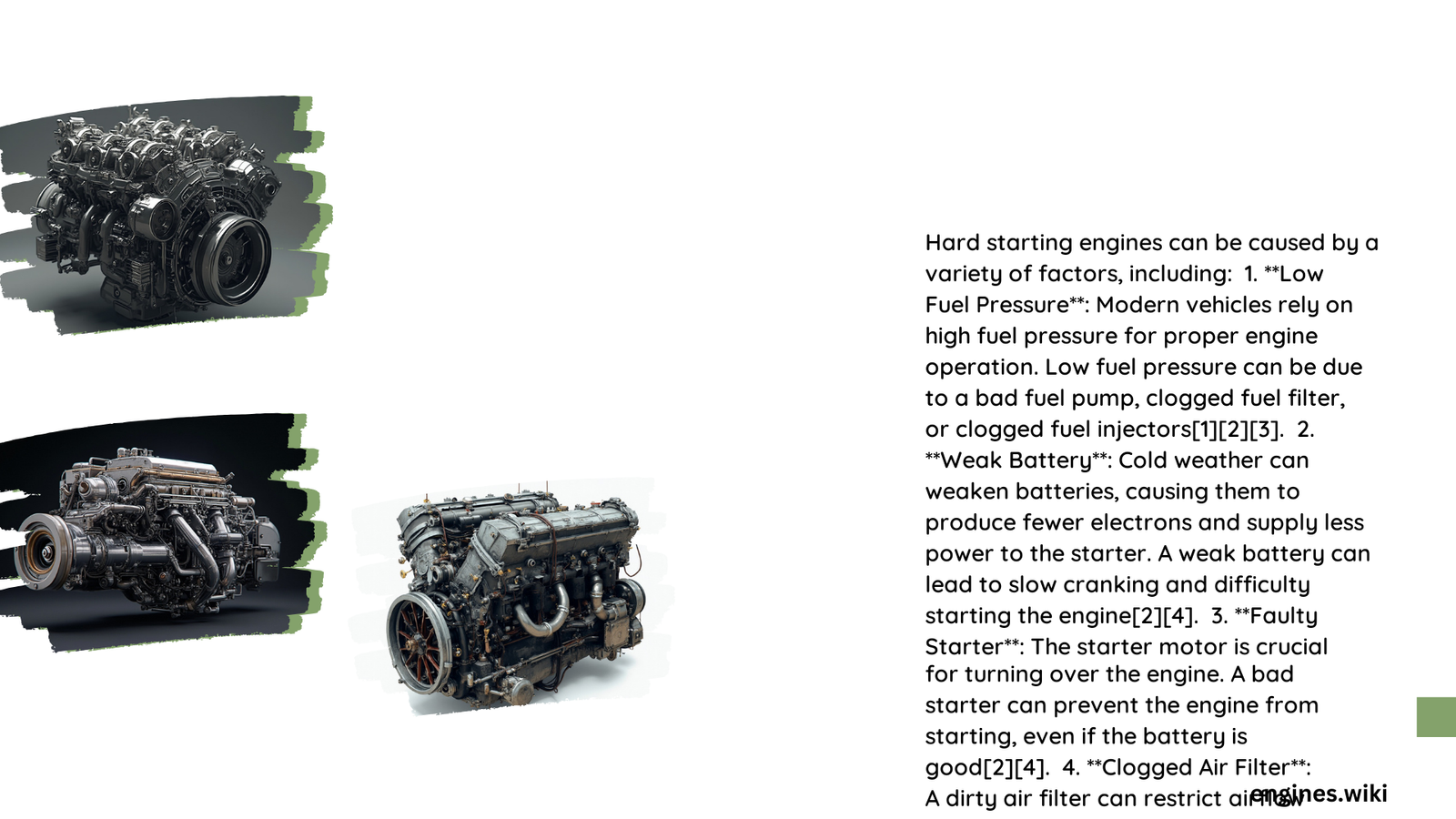A hard starting engine can be frustrating and indicative of various underlying issues. Common causes include fuel delivery problems, ignition system failures, battery issues, and air intake restrictions. These problems can manifest in different ways, such as low fuel pressure, weak spark, insufficient battery power, or restricted airflow. Understanding these causes and their specific symptoms is crucial for effective diagnosis and repair.
What Are the Main Causes of a Hard Starting Engine?
- Fuel Delivery Issues
- Ignition System Failures
- Battery Problems
- Air Intake Restrictions
Let’s delve into each of these causes and explore their specific symptoms and potential solutions.
How Do Fuel Delivery Issues Affect Engine Starting?

Fuel delivery problems are a common cause of hard starting engines. These issues can stem from various components in the fuel system:
What Role Does Fuel Pump Pressure Play?
- A failing fuel pump can lead to insufficient fuel pressure, causing hard starts.
- Typical fuel pump pressure range: 30-50 PSI for most gasoline engines.
- Low pressure can result in inadequate fuel delivery to the engine.
How Do Fuel Injector Flow Rates Impact Starting?
- Fuel injectors must deliver precise amounts of fuel for proper combustion.
- Typical flow rates: 19-24 lb/hr or 240-300 cc/min.
- Clogged or malfunctioning injectors can disrupt this balance, leading to hard starts.
What Effect Does a Clogged Fuel Filter Have?
- A clogged fuel filter restricts fuel flow to the engine.
- Micron ratings for fuel filters: typically 2-10 microns.
- Pressure drop across a new filter: <1 PSI.
- Pressure drop across a clogged filter: Several PSI, significantly impacting fuel delivery.
What Are the Ignition System Failures That Cause Hard Starts?
The ignition system is crucial for starting an engine. Failures in this system can lead to hard starts or no-start conditions:
How Does Spark Plug Condition Affect Starting?
- Worn or fouled spark plugs can cause weak or inconsistent sparks.
- Spark plug gap: typically 0.028 to 0.060 inches, depending on the engine.
- Incorrect gap can lead to misfires and hard starts.
What Impact Does Coil Output Voltage Have?
- Ignition coil output voltage is critical for spark generation.
- Healthy coil output range: 5,000 to 30,000 volts (5-30 kV).
- Low output voltage can result in weak sparks and starting difficulties.
How Does Ignition Timing Affect Engine Starting?
- Faulty ignition timing significantly impacts engine start-up.
- Typical timing: 10-15 degrees BTDC for gasoline engines.
- Incorrect timing can cause poor performance and hard starts.
What Battery Problems Can Lead to Hard Starting?
Battery issues are a common culprit in hard starting engines, especially in cold weather:
How Do Cold Cranking Amps (CCA) Affect Starting?
- CCA measures a battery’s ability to start an engine in cold temperatures.
- CCA requirements:
- Small cars: 200-400 CCA
- Medium cars: 400-600 CCA
- Large cars and trucks: 600-1000 CCA or more
What Does Battery Electrolyte Specific Gravity Indicate?
- Specific gravity of battery electrolyte: 1.260 to 1.300 g/cm³ for a fully charged battery.
- Lower specific gravity indicates a discharged or failing battery.
How Does Parasitic Draw Impact Battery Performance?
- Normal parasitic draw: <50 mA.
- High parasitic draw can drain the battery, leading to hard starts.
How Do Air Intake Restrictions Contribute to Hard Starting?
Air intake issues can significantly impact engine starting and performance:
What Are Typical Airflow Rates for Proper Engine Function?
- Airflow rates through the air intake system: 200-600 CFM, depending on engine size and type.
- Restricted airflow can lead to hard starts and poor performance.
How Does Throttle Body Condition Affect Starting?
- Throttle body diameter: typically 2-4 inches for most passenger vehicles.
- A dirty or clogged throttle body can restrict airflow, causing starting issues.
What Impact Does Air Filter Condition Have?
- Pressure drop across a new air filter: <1 inH2O.
- Pressure drop across a dirty filter: Several inH2O.
- A clogged air filter restricts airflow, potentially causing hard starts.
Conclusion
Understanding the causes of hard starting engines is crucial for effective troubleshooting and maintenance. By addressing issues in fuel delivery, ignition systems, battery performance, and air intake, you can ensure your engine starts smoothly and reliably. Regular maintenance and prompt attention to warning signs can prevent many of these issues from developing into more serious problems.
References:
1. Sea Foam: Troubleshooting An Engine That’s Hard To Start
2. QS Auto Repair: 9 Reasons Why Your Car Struggles To Start But Runs Fine
3. Car From Japan: Car Hard To Start Problems: 6 Things To Watch Out
